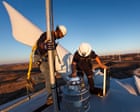
In a series of significant moves in the energy and infrastructure sectors, companies and governments are making decisive steps to adapt to changing priorities and sustain energy needs. These developments offer a calm yet informed perspective on the direction of global initiatives.
BP, a multinational oil company, has announced its decision to sell its US onshore wind business to LS Power. This action is part of BP’s broader strategy to divest $20 billion worth of assets. The sale includes BP’s share of 10 wind farms that currently generate enough clean energy to power more than 500,000 US households. While this marks a shift away from BP’s earlier investments in renewable energy, it enables the company to focus on its core operations. The transition signifies an ongoing dialogue in the energy sector about the balance between traditional and renewable energy sources. As these shifts occur, stakeholders continue to navigate towards a sustainable and energy-secure future.
On the European front, the European Union has formally approved an extension of its gas storage targets by two years. This directive requires member states to achieve 90% capacity in their gas storage facilities between October 1 and December 1 each year. The initiative aims to enhance energy resilience across EU countries, ensuring energy security during peak demand periods. This strategic move underscores the importance of adequate energy storage in mitigating supply disruptions and stabilizing energy availability for all EU citizens.
In parallel, significant domestic infrastructure projects are underway. In Portugal, the value of public works contracts has surged in the first half of the year, reaching a total of 2.828 million euros, according to the barometer by AICCOPN. This increase reflects the country’s commitment to enhancing its infrastructure and public spaces, fostering economic growth, and providing modern facilities for its citizens. The ongoing developments in public infrastructure signify positive outcomes for communities, as investments transform into tangible improvements in people’s daily lives.
Simultaneously, Worten, a prominent retail company, is making waves by constructing the largest logistics platform in Portugal, located in Castanheira do Ribatejo. When completed, this state-of-the-art logistics hub will employ 350 people regularly, with workforce numbers increasing during peak periods such as summer, Christmas, and Black Friday. The project exemplifies the evolving landscape of retail and its logistical needs, which drive economic opportunities and operational efficiencies. By expanding its logistical capabilities, Worten aims to streamline operations and enhance delivery efficiency for its growing customer base.
These developments, ranging from energy strategy adjustments to infrastructure enhancements, illustrate a worldwide pursuit of adaptability and progress. Through thoughtful and strategic planning, businesses, and governments are laying the foundation for a sustainable and robust future. As we navigate these changes, a calm and reasoned approach ensures we focus on opportunities for growth and improvement, all while mindfully embracing the complexities of our world. Together, these undertakings showcase a global commitment to securing vital resources, advancing economic prospects, and fostering a thriving society for generations to come.
Source: {link}
